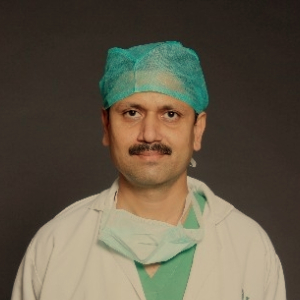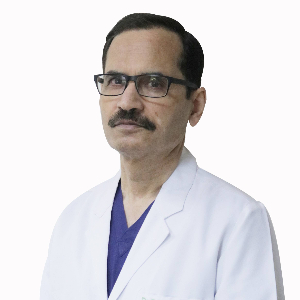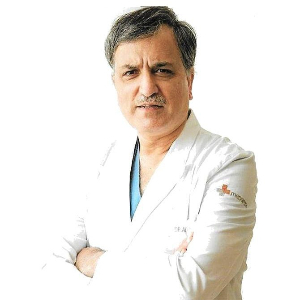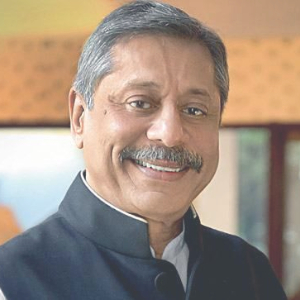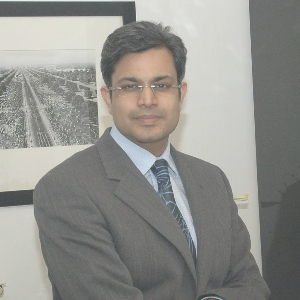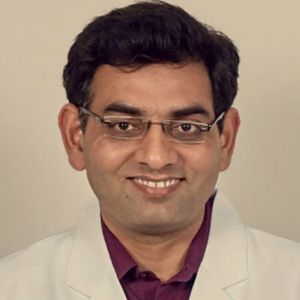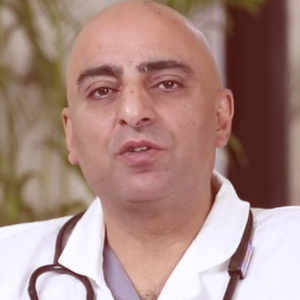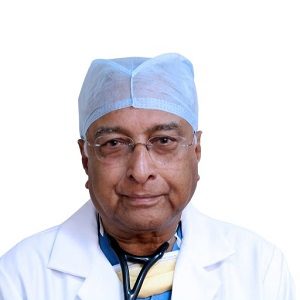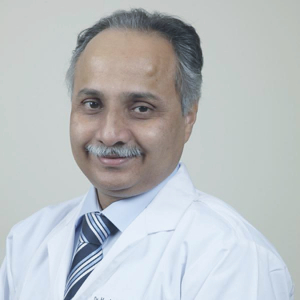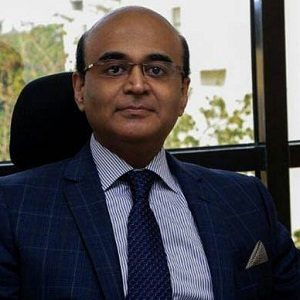Best Doctors in India for Thymectomy
- Surgical Oncologist, New Delhi, India
- Over 20 years’ experience
Profile Highlights:
- Dr. S M Shuaib Zaidi is a Senior Consultant of Surgical Oncology at Apollo Cancer Institute of Indraprastha Apollo Hospital.
- His expertise lies in the surgical treatment of cancer of the lungs, esophagus, breast, GI tract, and mediastinal regions.
- Dr. Shuaib Zaidi has close to 2 decades of experience in the field of Surgical Oncology and his expertise lies in Thoracic Oncology surgery.
- Dr. Shuaib is known to have developed an innovative technique known as Radical Neck dissection for head and neck cancer surgery that helps in preserving the marginal mandibular nerve in order to ease the cosmetic outcome of the procedure.
- Dr. Zaidi also has experience in Robotic Surgery and received training in the procedure from IRCAD in Strass Bourg, France.
- Cardiac Surgeon, New Delhi, India
- Over 30 years’ experience
Profile Highlights:
- Dr. Z S Meharwal is a well-known cardiac surgeon in India who has performed over 20,000 cardiac surgeries, including some of the most complex and high-risk cardiac procedures.
- Dr. Meharwal is a member of the founding team that started the Fortis Escorts Heart Institute and has been associated with the hospital since then.
- His interest lies in Minimally Invasive Cardiac procedures, valve repair, and replacement, and heart transplants among other major vascular and thoracic surgeries.
- Cardio Thoracic & Vascular Surgeon, Gurugram, India
- Over 35 years’ experience
Profile Highlights:
- Dr. Anil Bhan is an excellent Cardiovascular and thoracic surgeon who has performed more than 15,000 cardiac and vascular surgeries that include heart transplant surgery, aortic aneurysm surgery, pediatric cardiac surgery, valve repairs, and peripheral vascular surgery among several others.
- He is one of the best pediatric cardiac surgeons in Delhi/ NCR and is credited with performing heart bypass surgery on the youngest patient in India in 2007 (18 months).
- He performed the first extracorporeal membrane oxygenation and was the first to use a harmonic scalpel for harvesting radial mammary artery conduits in India in 2000 and 1995 respectively.
- Cardiac Surgeon, Gurugram, India
- Over 40 years’ experience
Profile Highlights:
- Dr. Naresh Trehan is one of the most highly skilled and globally recognized cardiothoracic and vascular surgeons.
- He started his career as a Cardiac Surgeon at New York University Medical Centre where he performed over 3000 coronary artery surgeries and returned to India in 1988 and founded the Escorts Heart Institute and Research Center in New Delhi.
- Dr. Trehan is the Founder Chairman of Medanta- The Medicity in Gurugram, a premier multi-specialty hospital with state-of-the-art infrastructure and equipped with the latest and advanced technologies.
- Cardio Thoracic & Vascular Surgeon, New Delhi, India
- Over 16 years’ experience
Profile Highlights:
- Dr. Mukesh Goel is a reputed Cardio-Thoracic and Vascular surgeon serving as a Senior Consultant of the specialty at Indraprastha Apollo Hospital, New Delhi.
- He carries an experience of 16+ years and has performed more than 3000 different cardiac surgeries. Dr. Mukesh Goel is constantly on the lookout to develop new and innovative techniques to perform cardiac procedures that help in quick recovery with minimum incisions.
- His expertise lies in on and off-pump bypass surgeries and also finds interest in beating heart bypass surgery, open-heart surgery, minimally invasive heart valve surgery, and pediatric cardiac surgery among several others.
- Dr. Mukesh Goel received his training in CTVS from one of the most renowned cardiac surgeons in India, Dr. Naresh Trehan, and has been using the exposure to perform various advanced and complex heart surgeries.
- Before joining Indraprastha, Dr. Goel has been associated with other prestigious heart centers in India like Escorts Heart Institute, Apollo Hospital in New Delhi, and Medanta in Gurugram where he helped in starting the Heart surgery unit.
- He frequently gets invited to attend cardiology conferences and seminars to deliver lectures and present papers. He also regularly takes part in workshops and CMEs for cardiac surgeries.
- Dr. Mukesh Goel is a keen researcher and has published a number of papers and articles on CTVS in renowned national and international medical journals.
- Surgical Oncologist, New Delhi, India
- Over 10 years’ experience
Profile Highlights:
- Dr. Surender Kumar Dabas is a well-known surgical oncologist with experience in the treatment of cancers affecting the head, neck, and thorax regions.
- He has over 10 years of experience in the field and has performed more than 8000 head, neck, and thoracic cancer surgeries.
- He also performs Robotic surgery and computer-assisted thoracoscopic surgeries along with surgery for skull base, oral cavity, esophagus, lungs, and thyroid cancers.
- Surgical Oncologist, New Delhi, India
- Over 26 years’ experience
Profile Highlights:
- Dr. Sameer Kaul is a surgical oncologist at Apollo Cancer Institute of Indraprastha Apollo Hospital, New Delhi
- He is the head of an independent Surgical Oncology Unit that comprises senior and junior consultants along with oncology nurses and other staff.
- Dr. Kaul performs all kinds of cancer surgeries related to the head and neck, breast, thoracic region, GI, genitourinary, soft tissues, and bones.
- He has 26+ years of experience in Surgical Oncology and has received his training from leading cancer centers of the world.
- Prior to joining Apollo, Dr. Sameer Kaul served in various other hospitals in India taking up different cancer cases and providing successful treatment.
- Dr. Sameer Kaul has extensive experience in Robotic surgeries and performs several of his procedures through Robotic techniques.
- He constantly works towards providing the best cancer care to the underprivileged section of society and therefore founded BCPBF – The Cancer Foundation, an NGO that works towards spreading cancer awareness.
- Dr. Kaul has been responsible for bringing various new and advanced techniques for cancer treatment to the country.
- He popularized Radio Frequency Ablation, Reconstruction for CA breast, and Post insertion in India
- Cardiac Surgeon, Cardiothoracic Surgeon, Vascular Surgeon; Chennai, India
- Over 45 years’ experience
Profile Highlights:
- Padma Bhushan awardee Dr. Girinath M R is a senior cardio-thoracic Surgeon in Chennai having experience of more than 45 years in Cardiac Surgery.
- Dr. M R Girinath was a fellow of Coronary Artery Surgery and Congenital Heart Surgery at the University of Wisconsin, USA.
- He provides consultation and diagnostic services for Mitral/Heart Valve Replacement, Cardiac Pacing, Invasive Cardiology, ABPM, Balloon Mitral Valvuloplasty, CT Angiography, etc.
- Surgical Oncologist, New Delhi, India
- Over 30 years’ experience
Profile Highlights:
- Dr. Harit Chaturvedi is considered among the best surgical oncologists in India. He has over 3 decades of experience in Surgical Oncology and provides services for the surgical treatment of various types of cancers affecting the breast, head and neck, oral, abdomen, and GI regions.
- He performs surgeries for cancer patients for the removal of both breasts and lymph nodes, removal of part or entire thyroid gland, breast-conserving surgery, surgery for removal of part or entire small intestine, surgery for prostate cancer, etc.
- Pediatric Cardiac Surgeon, Cardiothoracic and Vascular Surgeon, Chennai, India
- Over 21 years’ experience
Profile Highlights:
- Dr. Neville Solomon is one of the best Cardiothoracic Surgeons in South India.
- Dr. Neville Solomon heads the Cardiology unit; his team has performed over 6000 heart operations to date, including 3000 congenital cardiac surgeries in newborns and adults
- In addition to this, Dr. Solomon runs the Save a Child’s Heart Initiative (SACHI) Program with his associates at Apollo Hospital.
Best Hospitals in India for Thymectomy
Indraprastha Apollo Hospital, New Delhi
- City: New Delhi, India
Hospital Highlights:
- Indraprastha Apollo Hospital is a 700-bedded multispecialty hospital in the heart of the capital of India. It is a part of Apollo Hospital group, one of India’s most reputed healthcare chains. Indraprastha Apollo Hospital has been accredited by Joint Commission International, making it the first internationally accredited hospital in the country in 2005.
- There are 52 specialties in the hospital with one of the best cardiology centers in the country. The hospital is also equipped with State of the art infrastructure facilities with the largest Sleep Lab in Asia and the largest number of ICU bed facilities in India.
- The hospital also has one of the largest dialysis units in India along with a dedicated Bone Marrow Transplant unit.
- The latest and highly advanced technologies that are installed in the hospital include Da Vinci Robotic Surgery System, PET-MR, PET-CT, Cobalt-based HDR Brachytherapy, Brain Lab Navigation System, Tilting MRI, Portable CT scanner, 3 Tesla MRI, 128 Slice CT scanner, DSA Lab, Endosonography, Hyperbaric Chamber and Fibro scan.
Fortis Memorial Research Institute, Gurugram
- City: Gurugram, India
Hospital Highlights:
- Fortis Memorial Research Institute is a multi-super-specialty, quaternary care hospital with 1000 beds. The hospital comprises reputed clinicians, and international faculty and is also equipped with cutting-edge technology. The hospital is a part of Fortis Healthcare Limited, a reputed chain of private hospitals in India.
- It is a NABH-accredited hospital that is spread across 11 acres of land and has a capacity of 1000 beds. The hospital has 55 specialties and is one of the premier health care centers in the Asia Pacific region popularly known as “the Mecca of Healthcare”.
- The hospital has 260 diagnostic centers and is also equipped with the latest and advanced techniques that include 3 Telsa which is the world’s first Digital MRI technology. The hospital also has world-class Radiation Therapy techniques which have been developed by leading technology experts from Elekta and Brain Lab.
Apollo Hospital, Chennai
- City: Chennai, India
Hospital Highlights:
- Apollo Hospitals, Chennai, is one of the best hospitals for heart care in India. Over the years, Apollo has expanded all over India, as a healthcare chain.
- India’s first ‘Only Pancreas’ transplant was performed in Apollo Hospital. The hospital is known for successfully performing Asia’s first en-bloc combined heart and liver transplant, and over the years, it has attained a remarkable achievement in the global healthcare space. Around 3-4 organ transplants are performed in the hospital per day.
- Equipped with over 500 beds, this hospital in Chennai was established in 1983 and since then has been among the most preferred hospital for patients from all over the world.
- The hospital holds accreditation of the NABH and JCI and is the first hospital in India to be ISO 9001 and ISO 14001 certified. It is also the first South Indian Hospital to receive subsequent reaccreditation from the JCI USA 4 times.
Medanta-The Medicity, Gurgaon
- City: Gurugram, India
Hospital Highlights:
- One of India’s best and largest multi-specialty hospitals, Medanta was built with the aim to bring India to the highest standards of medical care. The hospital has been providing the best medical services to its patients, since its inception, with care, commitment, and compassion.
- Equipped with 1250 beds, the hospital was founded by Dr. Naresh Trehan in the year 2009 with an aim to provide the best medical care at affordable costs. The hospital is spread across 43 acres and includes 45 operation theatres and 350 beds dedicated solely to ICU. The hospital includes over 800 doctors, and more than 22 specialty departments and has a dedicated floor for individual specialty in order to offer the best services under one roof.
- The hospital is considered one of the premier institutes in India for Cardiac Care and includes staffs and members of high caliber. The hospital has 6 distinct centers of excellence.
Max Super Specialty Hospital, New Delhi
- City: New Delhi, India
Hospital Highlights:
- One of the well-regarded providers in India committed to the highest standards of clinical excellence and patient care, Max Super Specialty Hospital is a part of Max Healthcare, which is the second-largest healthcare chain in India. Regarded as one of the most well-regarded healthcare providers in the country, Max Super Specialty Hospital is committed to the highest standards of clinical excellence as well as patient care. The hospital is also equipped with the latest technology as well as cutting-edge research. The hospital is known to deliver and ensure the highest level of patient care.
- The hospital has more than 500 beds and offers treatment for over 35 specialties. The hospital also holds the credit of having installed the first Brain Suite in Asia. This is a highly advanced Neurosurgical machine that allows MRI to be taken while surgery is ongoing.
- Other advanced and latest technologies are also installed in the hospital such as the 1.5 Tesla MRI machine, 64 Slice CT Angiography, 4D ECHO, LINAC, and 3.5T MRI machine.
Artemis Hospital, Gurugram
- City: Gurugram, India
Hospital Highlights:
- One of the most well-known hospitals in the Delhi NCR, Artemis Hospital is the first hospital in Gurugram to get accredited by the Joint Commission International.
- With more than 40 specialties, the hospital has been designed to be one of the most technically advanced hospitals in the country, with the best medical and surgical health care. The hospital has eleven special and dedicated centers, for Heart, Cancer, Neurosciences, etc.
- The latest technologies in the hospital include Endovascular Hybrid Operating Suite and Flat panel Cath Labs for the cardiovascular department, 3 Tesla MRI, 16 slice PET CT, 64 Slice Cardiac CT Scan, HDR Brachytherapy, and highly advanced Image Guided Radiation Therapy techniques (LINAC) are installed in the hospital.
- The hospital has won several awards as well, since its inception.
BLK Max Super Specialty Hospital, New Delhi
- City: New Delhi, India
Hospital Highlights:
- Equipped with 650 beds, BLK Superspecialty Hospital is the largest stand-alone private sector hospital in Delhi.
- With over 1500 healthcare providers and 150 globally renowned super specialists, the hospital is one of Asia’s largest Bone Marrow Transplant Centres. The hospital is known for having some of the best cancer doctors in the country.
- The hospital is NABH and NABL accredited and was inaugurated by the first Prime Minister of India. Pt. Jawahar Lal Nehru.
Gleneagles Global Hospitals, Chennai
- City: Chennai, India
Hospital Highlights:
- Established in 1999, Gleneagles Global Hospital, Chennai, is one of the top healthcare facilities in Southern India. It is part of the Gleneagles Hospital Chain, which is the fourth largest healthcare chain in the country. The hospital specializes in multi-organ transplants of kidneys, liver, lungs, heart, etc.
- The hospital has an excellent infrastructure and state-of-the-art lab and equipment set-up. The hospital boasts cutting-edge technologies, a highly skilled team of doctors and surgeons, and trained support staff. Located in Perumbakam, Chennai, it is one of India’s premier health care destinations. The hospital has performed some of the most complex surgical and clinical procedures in India including multi-organ transplantations.
- The hospital’s lung transplantation program is one of the best in the country. The hospital is known for having performed India’s first single lung transplant and first minimal invasive lung transplant. It is also the only Indian hospital to be associated with King’s College Hospital, London, United Kingdom for liver transplantations.
Fortis Hospital, Mulund, Mumbai
- City: Mumbai, India
Hospital Highlights:
- Fortis Hospital in Mulund is a 315-bed multi-speciality tertiary care hospital with five JCI accreditations that offers a wide variety of diagnostic and therapeutic services. The Fortis Hospital in Mulund delivers patient-centred treatment with cutting-edge technology, highly skilled and experienced surgeons, and paramedical staff.
- This institution houses Maharashtra’s largest multi-organ transplant centre. It is also the first heart transplant centre in western India to conduct 100 or more consecutive heart transplants in under four years. It is the only hospital in the city to have multi-organ transplants and has handled the youngest patient for angioplasty. Fortis Hospital Mulund now boasts the first advanced surgical robot in central Mumbai.
- Cardiology and heart surgery, urology, nephrology, neurosciences, orthopaedics, digestive care, emergency and critical care, and maternity care are among the services provided by the hospital.
Kokilaben Dhirubhai Ambani Hospital, Mumbai
- City: Mumbai, India
Hospital Highlights:
- Kokilaben Dhirubhai Ambani Hospital, Named after the wife of Indian industrialist Dhirubhai Ambani, the founder of Reliance Industries, this is one of the top hospitals in Mumbai. This 750-bed multi-specialty hospital became operational in 2009. Known as one of India’s most advanced tertiary care facilities, the hospital is designed to raise India’s global standing as a healthcare hub, with an emphasis on excellence in clinical services.
- Kokilaben Dhirubhai Ambani Hospital uses Protocol and Care Pathway based treatment models to ensure the best outcomes for patients.
- The hospital represents a confluence of top-notch talent, cutting-edge technology, state-of-the-art infrastructure, and, most importantly commitment.
- The hospital also holds the accreditation of the NABH, NABL, CAP, and JCI.
- The hospital has been recognized as the No. 1 Multispecialty Hospital in Mumbai and the West Zone for the fifth year in a row in 2020 by The Week.
Thymectomy
Thymectomy is a surgery for removing the thymus gland, which is located in the upper portion of the chest, behind your breastbone. The benefits of this procedure may not be experienced immediately after the procedure, which is why the patient will need to continue their medical regimen.
A thymus gland has been shown to play an important role in the development of myasthenia gravis. Removing the thymus is generally recommended for people over 60 years of years, who experience moderate to severe weakness from myasthenia gravis.
Purpose
The thymus gland can help in immune cell growth. It is generally active when you are an infant, but its function reduces as your age increases. The thymus acts abnormally when a person suffers from a condition known as myasthenia gravis. To treat this condition, thymectomy is sometimes considered.
This procedure is also considered if the thymus has a tumor, which is termed as thymoma. These tumors are generally associated with myasthenia gravis but might also be associated with other conditions.
The treatment can help to reduce the weakness of the patient, reduce the use of medications, or even achieve permanent remission of the disease.
Preparation
Prior to your procedure, your doctor might require a few tests which might include:
- X-rays
- Blood tests
- Urine tests
- Breathing tests
- Muscle strength tests
A special diet might be required which can include withholding foods and fluids prior to the surgery.
It is important to take the prescribed medications as your doctor recommends.
Arrange to have someone drive you as well as pick you up from the hospital or surgery center. You might also need to arrange for someone to help you at home, after the procedure.
Procedure
The procedure can be performed using several different surgical techniques which include:
Transsternal thymectomy
In transsternal thymectomy, the incision is made in your skin over the breastbone and the breastbone is divided to expose the thymus. This approach is also generally used for heart surgery. The surgeon then removes the thymus through this incision. He/she might remove any residual fat as well in the center of the chest which may be harboring extra thymic cells.
Transcervical thymectomy
In transcervical thymectomy, the surgeon creates the incision across the lower part of your neck, slightly above the breastbone. The surgeon will remove your thymus using this incision without dividing the sternum. This is mostly used in patients who are without thymoma with certain body-types.
Robotic thymectomy and Video-assisted thoracoscopic thymectomy (VATS)
Robotic thymectomy and Video-assisted thoracoscopic thymectomy (VATS) are minimally invasive techniques that use multiple tiny incisions in the chest. A camera is first inserted through one of the incisions and the surgery is performed with the guidance of the video. The surgeon then removes the thymus with the help of special surgical tools inserted into the other incisions. In a robotic-assisted procedure, the surgeon makes the use of robotic arms for performing the surgery. Their goal is to provide the same result as the more invasive transsternal approach with less post-operative discomfort as well as quicker recovery.
Generally, the transsternal approach is generally the most common approach for this surgery. Even though the methods may vary, the goal of the surgery always remains the same, i.e. removal of the thymus for the best possible outcome. While some surgeons are of the opinion that removal of the fatty tissue adjoining the thymus is best, others claim that the removal of the thymus alone is sufficient.
You can discuss the surgical approaches with your doctor to determine which method is the best suitable for you.
Recovery
Depending on the type of surgery as well as the condition of the patient, in some cases, a ventilator might be required after the surgery. Once the breathing tube has been removed, the patient will need to breathe deeply as well as cough repeatedly to clear the lungs of any mucus.
The patient might require one or two chest tubes, i.e. small tubes in the chest attached to drainage bottles, which will be removed shortly after surgery.
With the transcervical or VATS thymectomy, pain is generally mild, but it can be a bit more with the trans-sternal approach. However, the pain is temporary and can be controlled through the use of pain medications. The pain should resolve in less than a week.
How long you will need to stay at the hospital can depend on the surgical approach that was used and your overall health. Sometimes patients can be discharged in a few days to a week.
Keep away from your regular routine for a while, depending on your condition, the type of surgery that was done, as well as the nature of your work. On average, it is important to limit activities for around three to six weeks.
You will need to contact your doctor if you see your recovery not progressing properly, as expected as you develop complications, such as:
- Signs of infection, which includes fever and chills
- Redness, increasing pain, excessive bleeding, or any discharge from the incision site
- Uncontrollable pain with the medications that you received
- Cough or difficulty breathing or chest pain
- Pain or swelling in your feet
- Pain or burning or other complications while urination
- Nausea and vomiting which continues to persist
Risks and complications
Though complications are rare, generally the risks of this procedure include:
- Infection
- Bleeding
- Nerve injury
- Lung injury

